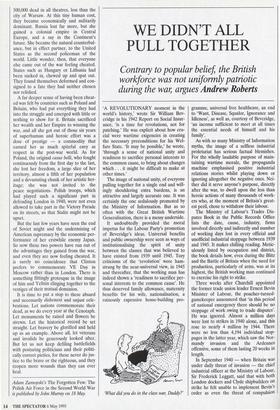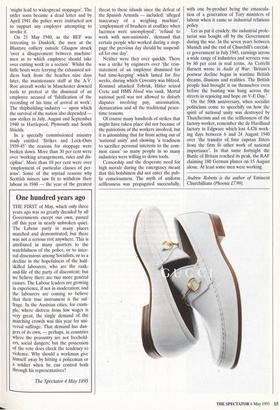WE DIDN'T ALL PULL TOGETHER
Contrary to popular belief the British workforce was not uniformly patriotic during the war, argues Andrew Roberts
`A REVOLUTIONARY moment in the world's history,' wrote Sir William Bev- eridge in his 1942 Report on Social Insur- ance, `is a time for revolutions, not for patching.' He was explicit about how cru- cial were wartime exigencies in creating the necessary preconditions for his Wel- fare State. 'It may be possible,' he wrote, `through a sense of national unity and readiness to sacrifice personal interests to the common cause, to bring about changes which . . . it might be difficult to make at other times.'
The image of national unity, of everyone pulling together for a single end and will- ingly shouldering extra burdens, is an attractive and largely accurate one. It was certainly the one sedulously promoted by the Ministry of Information. But as so often with the Great British Wartime Generalisation, there is a messy underside.
It undoubtedly provided the moral impetus for the Labour Party's promotion of Beveridge's ideas. Universal benefits and public ownership were seen as ways of institutionalising the spirit of unity between the classes that was believed to have existed from 1939 until 1945. Tory criticisms of the 'revolution' were ham- strung by the near-universal view, in 1945 and thereafter, that the working man has indeed shown a 'readiness to sacrifice per- sonal interests to the common cause'. He thus deserved family allowance, maternity benefits for his wife, nationalisation, a ruinously expensive home-building pro- `What did you do in the class war, Daddy?' gramme, universal free healthcare, an end to 'Want, Disease, Squalor, Ignorance and Idleness', as well as, courtesy of Beveridge, `an income sufficient to meet at all times the essential needs of himself and his family'.
As with so many Ministry of Information myths, the image of a selfless industrial proletariat has serious factual blemishes. For the wholly laudable purpose of main- taining wartime morale, the propaganda machine emphasised positive industrial relations stories whilst playing down or ignoring altogether the negative ones. Nei- ther did it serve anyone's purpose, directly after the war, to dwell upon the less than heroic actions of many thousands of work- ers who, at the moment of Britain's great- est peril, chose to withdraw their labour.
The Ministry of Labour's Trades Dis- putes Book in the Public Records Office lists the date, cause, industry, firms involved directly and indirectly and number of working days lost in every official and unofficial industrial stoppage between 1939 and 1945. It makes chilling reading. Metic- ulously listed by occupation and district, the book details how, even during the Blitz and the Battle of Britain when the need for production, particularly of arms, was at its highest, the British working man continued to exercise his right to strike.
Three weeks after Churchill appointed the former trade union leader Ernest Bevin Minister of Labour, the poacher-turned- gamekeeper announced that 'in this period of national emergency there should be no stoppage of work owing to trade disputes'. He was ignored. Almost a million days were lost to strikes in 1940 alone, and this rose to nearly 4 million by 1944. There were no less than 4,194 individual stop- pages in the latter year, which saw the Nor- mandy invasion and the Ardennes offensive, some of them lasting 20 weeks in length.
In September 1940 — when Britain was under daily threat of invasion — the chief industrial officer at the Ministry of Labour, Sir Frederick Leggatt, said that with both London dockers and Clyde shipbuilders on strike he felt unable to implement Bevin's order as even the threat of compulsion `might lead to widespread stoppages'. The order soon became a dead letter and by April 1941 the police were instructed not to support any employer attempting to invoke it.
On 21 May 1940, as the BEF was retreating to Dunkirk, the men at the Blantyre colliery outside Glasgow struck `over a disagreement between, machine- men as to which employee should take over cutting work in a section'. Whilst the little boats were ferrying the exhausted sol- diers back from the beaches nine days later, the maintenance staff at the A.V. Roe aircraft works in Manchester downed tools to protest at the dismissal of an employee accused of 'falsification of the recording of his time of arrival at work'. The shipbuilding industry — upon which the survival of the nation also depended saw strikes in July, August and September 1940 in Hartlepool, Plymouth and South Shields.
In a specially commissioned ministry study entitled 'Strikes and Lock-Outs 1939-45' the reasons for stoppage were broken down. More than 30 per cent were over 'working arrangements, rules and dis- cipline'. More than 10 per cent were over `employment of particular classes of per- sons'. Some of the myriad reasons why Scottish miners saw fit to withdraw their labour in 1940 — the year of the greatest threat to these islands since the defeat of the Spanish Armada — included: 'alleged inaccuracy of a weighing machine', `employment of brushers at coalface when facemen were unemployed', 'refusal to work with non-unionists', 'demand that certain people who worked during a stop- page the previous day should be suspend- ed for one day'.
Neither were they over quickly. There was a strike by engineers over 'the rein- statement of an employee dismissed for bad time-keeping' which lasted for five weeks, during which Coventry was blitzed, Rommel attacked Tobruk, Hitler seized Crete and HMS Hood was sunk. Mortal national peril was not allowed to disturb disputes involving pay, unionisation, demarcation and all the traditional peace- time reasons.
Of course many hundreds of strikes that might have taken place did not because of the patriotism of the workers involved, but it is astonishing that far from acting out of `national unity' and showing 'a readiness to sacrifice personal interests to the com- mon cause' so many people in so many industries were willing to down tools.
Censorship and the desperate need for high morale during the emergency meant that this bolshiness did not enter the pub- lic consciousness. The myth of uniform selflessness was propagated successfully, with one by-product being the emascula- tion of a generation of Tory ministers of labour when it came to industrial relations policy.
Let us put it crudely: the industrial prole- tariat was bought off by the Government during the war. In the seven years between Munich and the end of Churchill's caretak- er government in July 1945, earnings across a wide range of industries and services rose by 80 per cent in real terms. As Correlli Barnett wrote in Audit of War: 'Britain's postwar decline began in wartime British dreams, illusions and realities. The British people had brought it on themselves even before the bunting was hung across the streets in rejoicing and hope on V-E Day.'
On the 50th anniversary, when socialist politicians come to speechify on how the spirit of national unity was destroyed by Thatcherism and on the selflessness of the factory worker, remember the de Havilland factory in Edgware which lost 4,426 work- ing days between 6 and 24 August 1940 over 'the transfer of four capstan fitters from the firm tb other work of national importance'. In that same fortnight the Battle of Britain reached its peak, the RAF claiming 180 German planes on 15 August alone. At least some men were working.
Andrew Roberts is the author of Eminent Churchillians (Phoenix f7.99).



































































 Previous page
Previous page